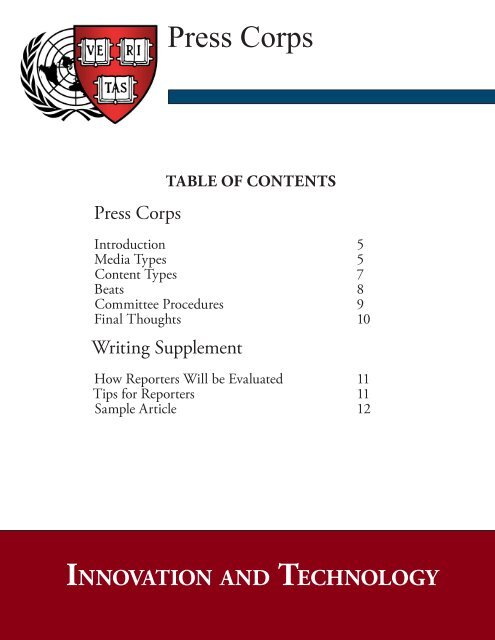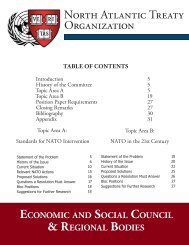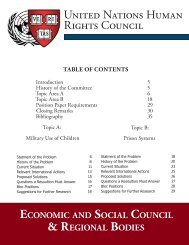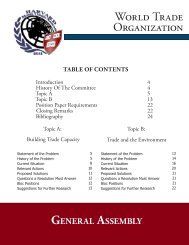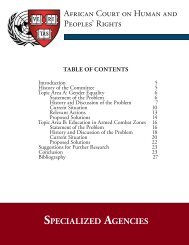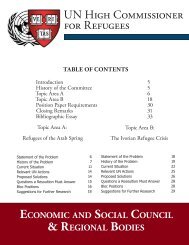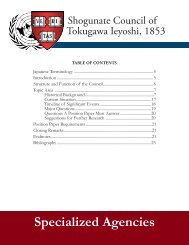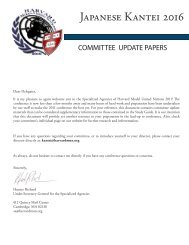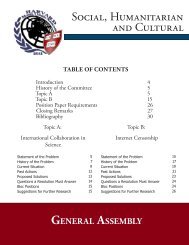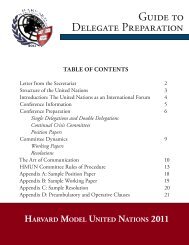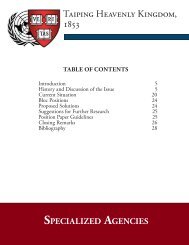Press Corps - Harvard Model United Nations
Press Corps - Harvard Model United Nations
Press Corps - Harvard Model United Nations
Create successful ePaper yourself
Turn your PDF publications into a flip-book with our unique Google optimized e-Paper software.
<strong>Press</strong> <strong>Corps</strong><br />
<strong>Press</strong> <strong>Corps</strong><br />
Table of Contents<br />
Introduction 5<br />
Media Types 5<br />
Content Types 7<br />
Beats 8<br />
Committee Procedures 9<br />
Final Thoughts 10<br />
Writing Supplement<br />
How Reporters Will be Evaluated 11<br />
Tips for Reporters 11<br />
Sample Article 12<br />
Innovation and Technology<br />
Specialized Agencies<br />
1
<strong>Press</strong> <strong>Corps</strong><br />
<strong>Harvard</strong> <strong>Model</strong> <strong>United</strong> <strong>Nations</strong> 2012<br />
A Letter from the Secretary-General<br />
Dear Delegates,<br />
Hunter M. Richard<br />
Secretary-General<br />
Stephanie N. Oviedo<br />
Director-General<br />
Ana Choi<br />
Under-Secretary-General<br />
Administration<br />
Ainsley Faux<br />
Under-Secretary-General<br />
Business<br />
Alexandra M. Harsacky<br />
Comptroller<br />
Sofia Hou<br />
Under-Secretary-General<br />
Innovation and Technology<br />
Juliana Cherston<br />
Under-Secretary-General<br />
General Assembly<br />
S. Ethan Lyle<br />
Under-Secretary-General<br />
Economic and Social Council<br />
Charlene S. Wong<br />
Under-Secretary-General<br />
Specialized Agencies<br />
I could not be more honored to welcome you to the fifty-ninth session of <strong>Harvard</strong> <strong>Model</strong><br />
<strong>United</strong> <strong>Nations</strong>. Our entire staff of 205 <strong>Harvard</strong> undergraduates is eager to join with you<br />
this January at the Sheraton Boston for an exciting weekend of debate, diplomacy, and<br />
cultural exchange. You and your 3,000 fellow delegates join a long legacy of individuals<br />
passionate about international affairs and about the pressing issues confronting our World.<br />
Founded in 1927 as <strong>Harvard</strong> <strong>Model</strong> League of <strong>Nations</strong>, our organization has evolved<br />
into one of America’s oldest, largest, and most international <strong>United</strong> <strong>Nations</strong> simulations.<br />
Drawing from this rich history, <strong>Harvard</strong> <strong>Model</strong> <strong>United</strong> <strong>Nations</strong> has strived to emphasize<br />
and promote the unique impact of the UN and its mandates in the eradication of humanity’s<br />
greatest problems. Despite its difficulties and often-unfortunate image in the press, the<br />
<strong>United</strong> <strong>Nations</strong> is truly a global body with representation of 193-member states and is the<br />
closest the World has ever achieved to a “Parliament of Man.”<br />
At HMUN, we strive to recreate this body and the international environment it fosters<br />
through our emphasis on welcoming more and more international delegations to our<br />
conference each year. For the fifty-ninth session, HMUN is proud to welcome delegations<br />
from over 35 countries to share their experiences with others from across the World. Not<br />
only can you debate global issues in committee, but also discuss the China-US relations with<br />
a delegate hailing from Shanghai or EU economic policy with a delegate from Germany. I<br />
encourage you to go above and beyond research and discussions within your committee to<br />
learn from your fellow delegates.<br />
In this guide, you are about to embark on a valuable intellectual endeavor. Your committee<br />
director has worked tirelessly to research and compile this extensive background guide.<br />
Please use it as a foundation in your own research for committee and to contribute to<br />
your debates and final resolutions. I wish you the best of luck in your preparation and in<br />
committee this January.<br />
Sincerely,<br />
59 Shepard Street, Box 205<br />
Cambridge, MA 02138<br />
Voice: (617)-398-0772<br />
Fax: (617) 588-0285<br />
Email: info@harvardmun.org<br />
www.harvardmun.org<br />
Hunter M. Richard<br />
Secretary-General<br />
<strong>Harvard</strong> <strong>Model</strong> <strong>United</strong> <strong>Nations</strong> 2012<br />
secgen@harvardmun.org<br />
22 Innovation Specialized and Technology Agencies
<strong>Press</strong> <strong>Corps</strong><br />
<strong>Harvard</strong> <strong>Model</strong> <strong>United</strong> <strong>Nations</strong> 2012<br />
Dear Delegates of <strong>Press</strong> <strong>Corps</strong>,<br />
Hunter M. Richard<br />
Secretary-General<br />
Stephanie N. Oviedo<br />
Director-General<br />
Ana Choi<br />
Under-Secretary-General<br />
Administration<br />
Ainsley Faux<br />
Under-Secretary-General<br />
Business<br />
Alexandra M. Harsacky<br />
Comptroller<br />
Sofia Hou<br />
Under-Secretary-General<br />
Innovation and Technology<br />
Juliana Cherston<br />
Under-Secretary-General<br />
General Assembly<br />
S. Ethan Lyle<br />
Under-Secretary-General<br />
Economic and Social Council<br />
Charlene S. Wong<br />
Under-Secretary-General<br />
Specialized Agencies<br />
Welcome to the <strong>Press</strong> <strong>Corps</strong> Program of <strong>Harvard</strong> <strong>Model</strong> <strong>United</strong> <strong>Nations</strong> 2011! It is my<br />
honor to have you all in one of the most innovative committees at HMUN. Having read<br />
all of your Special Applications, I am confident that not only will you bring creativity<br />
and passion to the conference, but you will also enjoy your four days here as <strong>Press</strong> <strong>Corps</strong><br />
reporters.<br />
The <strong>Press</strong> <strong>Corps</strong> at HMUN is truly a unique committee. You will get the opportunity to<br />
interact with every other committee, use cutting technology to create videos and blogs,<br />
and get to know the staff behind the scenes of HMUN 2012. There is no comparison in<br />
terms of committee dynamism. From interviewing delegates and directors, to holding press<br />
conferences, to writing up opinion and news pieces, to photography and using the cuttingedge<br />
GreenScreen technology, <strong>Press</strong> <strong>Corps</strong> has it all.<br />
But most importantly, you will provide the media coverage for the entire conference.<br />
Through the <strong>Press</strong> <strong>Corps</strong> website, all the delegates, staff, and faculty advisors will be able to<br />
follow the most recent events.<br />
The <strong>Press</strong> <strong>Corps</strong> staff has also been working tremendously hard over the past months to<br />
make the delegate experience truly spectacular. They bring their own experience and passion<br />
to <strong>Press</strong> <strong>Corps</strong> and are fully committed to making this year’s <strong>Press</strong> <strong>Corps</strong> the best <strong>Press</strong><br />
<strong>Corps</strong>.<br />
When reading this study guide, I urge delegates to go beyond in terms of scope - be it<br />
researching a committee beforehand or staying on top of the current news. As always, please<br />
feel free to ask me any questions before the conference. I look forward to seeing you in<br />
Boston in January.<br />
Sincerely,<br />
Sofia Hou<br />
59 Shepard Street, Box 205<br />
Cambridge, MA 02138<br />
Voice: (617)-398-0772<br />
Fax: (617) 588-0285<br />
Email: info@harvardmun.org<br />
www.harvardmun.org<br />
Sofia Hou<br />
Under-Secretary-General for Innovation and Technology<br />
297 Winthrop Mail Center<br />
Cambridge MA, 02138<br />
subsup@harvardmun.org<br />
Innovation and Technology<br />
3
<strong>Press</strong> <strong>Corps</strong><br />
<strong>Harvard</strong> <strong>Model</strong> <strong>United</strong> <strong>Nations</strong> 2012<br />
Dear Reporters,<br />
Hunter M. Richard<br />
Secretary-General<br />
Stephanie N. Oviedo<br />
Director-General<br />
Ana Choi<br />
Under-Secretary-General<br />
Administration<br />
Ainsley Faux<br />
Under-Secretary-General<br />
Business<br />
Alexandra M. Harsacky<br />
Comptroller<br />
Sofia Hou<br />
Under-Secretary-General<br />
Innovation and Technology<br />
Juliana Cherston<br />
Under-Secretary-General<br />
General Assembly<br />
S. Ethan Lyle<br />
Under-Secretary-General<br />
Economic and Social Council<br />
Charlene S. Wong<br />
Under-Secretary-General<br />
Specialized Agencies<br />
My name is Varun Bansal, and I am pleased to have the honor of welcoming you to <strong>Harvard</strong> <strong>Model</strong><br />
<strong>United</strong> <strong>Nations</strong> 2012, and to the HMUN <strong>Press</strong> <strong>Corps</strong>. I am looking forward to an exciting and<br />
enriching experience at conference in January.<br />
Before we begin, a bit on me: I am a junior at <strong>Harvard</strong>, and am studying applied mathematics with<br />
a focus in economics. I am originally from around Washington, D.C., and have been participating<br />
in MUN since my freshman year of high school. Beyond MUN, I am Co-Editor-in-Chief of the<br />
<strong>Harvard</strong> International Review, a magazine on international affairs sold in over 75 countries across<br />
the world.<br />
Though all committees at HMUN are exciting, the <strong>Press</strong> <strong>Corps</strong> is going to be one of the best experiences<br />
imaginable. I am particularly excited to run the <strong>Press</strong> <strong>Corps</strong> this year as we are deeply<br />
integrating technology into the <strong>Press</strong> <strong>Corps</strong>, and the <strong>Press</strong> <strong>Corps</strong> into conference. As a reporter, you<br />
are promised an unparalleled experience in the subtle sciences of communication and persuasion.<br />
With direct access to electronic feeds streaming across the hotel and the latest technology, you will<br />
constitute one of the most connected and widely-read <strong>Press</strong> <strong>Corps</strong> in <strong>Model</strong> UN history. The work<br />
that you produce will be read or viewed instantly across conference. With the choice of creating<br />
written, photographic, drawn, or video content, you have the flexibility to catch and hold people’s<br />
attention. You will be able to interview delegates, interrogate delegates at press conferences, pry secrets<br />
from delegates and leak them to the public, and spy on unmoderated caucuses to get the latest<br />
news possible. Your substantive role is tremendous. With one well-written stroke of the pen and an<br />
artfully framed press leak, you can single-handedly change the outcome of debate in a committee.<br />
But it’s not all work and serious matters. In between driving debate across conference, you will be<br />
able to write for HMUN’s blog, “The Unmoderated Caucus,” and discuss everything from delegate<br />
fashion to creative ways to circumvent the rules of procedure.<br />
Before we begin, it is helpful to come into conference with a basic idea of what is expected. In this<br />
guide, you will find information on how committee will be run, which beats you will have the option<br />
of covering, and what media will be used by the <strong>Press</strong> <strong>Corps</strong> during the conference. If you have<br />
any questions or concerns, please do not hesitate to email me at presscorps@harvardmun.org, and I<br />
will be happy to assist. I look forward to meeting you at conference!<br />
Best,<br />
Varun Bansal<br />
Varun Bansal<br />
Director of <strong>Press</strong> <strong>Corps</strong><br />
59 Shepard Street, Box 205<br />
Cambridge, MA 02138<br />
Voice: (617)-398-0772<br />
Fax: (617) 588-0285<br />
Email: info@harvardmun.org<br />
www.harvardmun.org<br />
presscorps@harvardmun.org<br />
44 Innovation Specialized and Technology Agencies
<strong>Press</strong> <strong>Corps</strong><br />
<strong>Press</strong> <strong>Corps</strong><br />
Introduction<br />
In most countries across the world, the presence<br />
of the press serves as an equalizer of society. Bringing<br />
information to all and throwing light upon closed portions<br />
of society, the press has been and is a transformative part<br />
of modern society. Most significantly, as far as we are<br />
concerned, the press serves a vital role in connecting citizens<br />
and governing bodies. By freely reporting on the happenings<br />
of those in power, the press serves as a vital source of data,<br />
providing citizens with the information they need to hold<br />
their leaders accountable and to advance society through<br />
responsible governance. Similarly, on the international level,<br />
the press keeps our global governing bodies accountable<br />
and helps to inform the world of current events. Just as<br />
importantly, the press significantly influences the course<br />
of debate, as leaders themselves also consume news media.<br />
Reporters thereby hold a powerful position within society,<br />
their stories helping to shape the outcomes. Everything -<br />
from deciding upon the subject, to publishing opinion pieces,<br />
to selecting footage - influences society and leaders.<br />
Just as on the global stage, the <strong>Press</strong> <strong>Corps</strong> plays<br />
a valuable role at HMUN. It is your responsibility, as a<br />
reporter at HMUN, to report fairly, accurately, and quickly<br />
on the proceedings of the committees. The information<br />
you publish will ensure that no committees are conducting<br />
undesirable business, from crooked decisions to taking<br />
actions that squash human rights. A video you record might<br />
single-handedly expose a committee’s doings. A press leak<br />
could cripple a country’s security cabinet. A press conference<br />
could change the course of debate and push a particular<br />
resolution to passage.<br />
As a reporter at HMUN, you will be in the thick of<br />
the action and will be embedded deep within the HMUN<br />
simulation. The moment you arrive at HMUN, you are<br />
a reporter for the <strong>Press</strong> <strong>Corps</strong>—something you shouldn’t<br />
forget. Remember that you are covering the conference from<br />
the perspective of actual reporters covering the doings of<br />
the actual <strong>United</strong> <strong>Nations</strong>, not from the perspective of high<br />
school students covering a MUN conference. This means<br />
that your coverage probably will not refer to “HMUN” but<br />
instead will treat the committees and conference as if it were<br />
the actual <strong>United</strong> <strong>Nations</strong>.<br />
There is one exception—the blog. As in the past, the<br />
HMUN <strong>Press</strong> <strong>Corps</strong> blog, The Unmoderated Caucus, is a<br />
free-for-all forum for you to showcase your more creative<br />
side. From interesting clothing choices to overheating<br />
Innovation and Technology<br />
committee rooms, this is your chance to highlight your<br />
more creative side. Most important, here, however, is the<br />
reporting on the committees themselves.<br />
As a member of the <strong>Press</strong> <strong>Corps</strong>, you will undeniably have<br />
one of the richest experiences of any HMUN attendee. You<br />
might find yourself sprinting to a committee room after a<br />
tip-off of a delegate shouting match, fiercely interrogating a<br />
delegate during a press conference, or meeting a delegate in<br />
an isolated corner of the hotel as they whisper state secrets<br />
to you. Whatever you do, never forget the immense role you<br />
play in HMUN and across the world. As Adlai Stevenson,<br />
former Vice President of the <strong>United</strong> States, once said, “The<br />
free press is the mother of all our liberties and of our<br />
progress under liberty.”<br />
Media Types<br />
News organizations around the world are in the<br />
midst of a transition from traditional, print-based media<br />
to more digital media, ranging from websites to television<br />
broadcasts to smartphone apps. In keeping with (and ahead<br />
of) the times, the <strong>Press</strong> <strong>Corps</strong> has a wide range of media<br />
through which you can communicate news. Traditional<br />
broadsheet newsprint will not be used; instead, in an<br />
effort to reduce wasteful paper consumption, written news<br />
pieces will be published online and beamed to the news<br />
tickers placed throughout the conference center. Some<br />
television monitors across the hotel will also be displaying<br />
our homepage. Reporters can create videos (to be played<br />
continuously across the hotel), take photos, create visual<br />
graphics (e.g. political cartoons), blog on the website, and<br />
engage in social media (e.g. Twitter).<br />
More detailed tips, details, and requirements are<br />
provided in the supplement to this study guide. It is highly<br />
recommended that all reporters review the supplement in<br />
addition to this study guide.<br />
5
<strong>Press</strong> <strong>Corps</strong><br />
Written Content<br />
As mentioned previously, the majority of the<br />
content the <strong>Press</strong> <strong>Corps</strong> produces is likely to be written<br />
(similar to what might be found in a traditional newspaper),<br />
and published primarily on our website. The advantage<br />
of written pieces is their extreme flexibility and ease of<br />
production. A written piece can be anything—an interview,<br />
a normal news story covering proceedings and events, or<br />
a quick news blurb. A quality piece should feature quotes<br />
and interviews and relevant facts about the situation. They<br />
answer the basic facts needed to comprehend an event:<br />
What’s going on? Who are the key players in committee?<br />
What are the consequences of what’s happening in<br />
committee? Is everyone in agreement or are there many<br />
dissenting opinions? A danger of reporting is to misrepresent<br />
the situation or get your facts wrong. Learning the context<br />
of a situation is important. So for instance, reporters will<br />
be expected to sit in on at least part of a committee session<br />
to gather background information and interview delegates<br />
for their articles. In some cases, a reporter will have to be<br />
present for an entire committee session in order to gather<br />
enough information to file a story, and in other instances,<br />
a reporter may only need to be present for an hour or so; it<br />
depends on the content of the piece being produced.<br />
Once a reporter has enough background<br />
information and quotes, he will write up his story on<br />
a computer in the <strong>Press</strong> <strong>Corps</strong> room or in an HMUN<br />
computer lab or using his personal laptop 1 and submit it for<br />
editing and posting on the HMUN media website. There<br />
are no length requirements for written pieces; reporters<br />
should simply strive to convey as much useful information as<br />
possible given the time constraints they will be facing. The<br />
exception is if a reporter would like an item to be added to<br />
the conference-wide news tickers or to the scrolling news bar<br />
on the video feeds across the hotel.<br />
Video<br />
<strong>Press</strong> <strong>Corps</strong> reporters will also have the option<br />
to work with various non-print media throughout the<br />
conference. The press room will be equipped with video<br />
cameras that reporters can use to record news broadcasts that<br />
will be posted on the HMUN media website. Broadcasts<br />
can be recorded either in front of a green screen, so that<br />
reporters can choose the backdrop for their broadcast to be<br />
digitally added, or on-location anywhere in the hotel, so long<br />
as the reporters do not interfere with committee sessions.<br />
1 <strong>Press</strong> <strong>Corps</strong> reporters may use their laptops if they own a<br />
laptop. However, laptops may only be used in the <strong>Press</strong> <strong>Corps</strong> room. Laptops<br />
cannot be WiFi connected, even in the <strong>Press</strong> <strong>Corps</strong> room. Remember<br />
that other delegates in other committees are not allowed to use their<br />
laptops. If you do not own or do not plan on bringing your laptop, we<br />
will have plenty of computers available in both the <strong>Press</strong> <strong>Corps</strong> room<br />
and in HMUN computer labs.<br />
Reporters can also use video cameras to record B-roll (that<br />
is, background footage) to include in broadcasts, again<br />
making sure not to disrupt committee sessions. Reporters<br />
using video will be expected to write out a script for their<br />
broadcast so that the news report is delivered fluidly and<br />
professionally.<br />
There is a lot of room for creativity in producing<br />
videos, and reporters should feel free to explore diverse<br />
content options in their broadcasts. For instance, broadcasts<br />
may be done as solo, stand-up reports, or reporters may wish<br />
to interview delegates on camera. Reporters might choose<br />
to have a particularly well-versed delegate provide some facts<br />
and statistics for the news report, or it might be interesting<br />
to interview two delegates with different views on an issue.<br />
If a reporter plans to interview a delegate in a video piece,<br />
the reporter should have a list of questions prepared, and<br />
the delegate should be informed of the general subject of the<br />
questions prior to the interview.<br />
After filming of a video spot is complete, the reporters will<br />
work with the <strong>Press</strong> <strong>Corps</strong> staff to edit the broadcast and<br />
upload it to the HMUN media website. Reporters and<br />
committee staff will be using iMovie to edit video, and<br />
though some knowledge of this software may be useful, it is<br />
by no means required of reporters.<br />
Photography<br />
HMUN reporters can also be photojournalists and<br />
will take photographs of committee sessions throughout<br />
the conference. These photos will be uploaded to the<br />
HMUN media website and will also serve as visual<br />
aids accompanying the print pieces published on the<br />
site. Remember, photojournalists are part of the HMUN<br />
simulation as well, and their photographs should be of a<br />
professional nature. The majority of photos should be<br />
candid shots of delegates doing something interesting in the<br />
committee room: engaging in formal and informal debate,<br />
raising placards, writing working papers, etc. Generally, the<br />
subjects of the photograph shouldn’t be looking directly at<br />
66 Innovation Specialized and Technology Agencies
<strong>Press</strong> <strong>Corps</strong><br />
the camera; otherwise the picture may look staged.<br />
Although HMUN may be able to provide some cameras,<br />
reporters who have digital cameras should bring them to<br />
the conference, along with any cables for uploading to<br />
computers. Reporters are responsible for their own cameras<br />
for the entire conference, as HMUN cannot reimburse<br />
reporters for lost or damaged cameras.<br />
Visual graphics<br />
Reporters also have the option of producing<br />
original, creative visual content for publication alongside<br />
print material and as standalone features on the HMUN<br />
media website. Examples of this kind of content would be<br />
political cartoons, sketches of committee proceedings (some<br />
committees may forbid photography, forcing a reporter to<br />
rely upon a drawing or sketch to circumvent such rules), data<br />
visualizations (e.g. graphs and displays of poll data), or any<br />
other visual graphic.<br />
Blog<br />
While most of the content produced by reporters<br />
will be of a substantive nature, the <strong>Press</strong> <strong>Corps</strong> will keep a<br />
blog throughout the conference called The Unmoderated<br />
Caucus. As the name suggests, this blog will be a free forum<br />
for reporters to post creative, humorous, witty, critical, or<br />
just plain gossipy conference updates. Reporters can make a<br />
list of the best-dressed delegates, or publish a guide of DOs<br />
and DON’Ts for the delegate dance. They can write about<br />
loopholes in the committee rules of procedures, or make a<br />
list of MUN-related pick-up lines. Anything goes, reporters<br />
should just remember to keep it positive and appropriate, as<br />
<strong>Press</strong> <strong>Corps</strong> staff will edit all blog posts.<br />
Other media<br />
The <strong>Press</strong> <strong>Corps</strong> also has use of news tickers,<br />
televisions, and other displays across the hotel to display<br />
our news. For instance, the news tickers can display short<br />
phrases, such as crises unfolding in committees, the passage<br />
of a resolution, etc. In this way, news can be disseminated<br />
immediately, while more lengthy articles, videos, and other<br />
media are being created. Further details on these other<br />
media will be explained at conference.<br />
Content Types<br />
In addition to classifying a <strong>Press</strong> <strong>Corps</strong> item by the<br />
type of media it uses, it can also be classified by the type<br />
of work it is. Though the types of content a reporter can<br />
produce are limitless, this guide will briefly summarize three<br />
different types to serve as a reference point for other content<br />
types.<br />
News pieces<br />
The most fundamental type of content the <strong>Press</strong><br />
<strong>Corps</strong> produces is a news piece. This is simply a factual<br />
article that should contain quotes, pertinent information,<br />
Social media<br />
The <strong>Press</strong> <strong>Corps</strong> will have a Twitter account<br />
(HMUNpress) that we will use to keep conference attendees<br />
informed of news updates throughout the conference, and<br />
reporters should always be on the lookout for interesting<br />
items to tweet about. For instance, a committee setting its<br />
first agenda topic may not warrant a full news article, but it<br />
is still interesting enough to merit a brief tweet informing<br />
people about what that committee will be discussing for the<br />
next day. If a delegate says something funny or profound<br />
in a speech, that would be tweet worthy too. Remember,<br />
tweets should be informative, amusing, or both. The <strong>Press</strong><br />
<strong>Corps</strong> staff will explain the procedures for updating the<br />
Twitter account at the conference.<br />
Innovation and Technology<br />
and timely facts. Further details on how to write a good<br />
news piece are included in the supplement.<br />
Opinion<br />
Reporters will also be able to participate in the<br />
debates taking place in the committee rooms by writing<br />
opinion pieces. As with news stories, reporters working on<br />
opinion pieces will be expected to sit in on at least part of<br />
a committee session to gather the necessary background<br />
information to formulate a coherent argument. A good<br />
opinion piece will present a strong thesis in the opening<br />
paragraphs and will support that thesis with evidence-based<br />
arguments. An opinion piece is only as good as its thesis,<br />
so it’s imperative that reporters put a lot of thought into the<br />
argument they will be making. For example, “The Security<br />
Council passed a bad resolution,” is too vague and would<br />
7
<strong>Press</strong> <strong>Corps</strong><br />
not be an appropriate thesis, while, “The Security Council<br />
passed an unfair resolution that imposes unreasonable<br />
economic sanctions on Iran,” is a much more interesting<br />
thesis, and one would expect that the rest of a column with<br />
that thesis would go on to argue exactly why the economic<br />
sanctions imposed on Iran are unfair.<br />
In many cases, it will be necessary for reporters<br />
writing opinion pieces to interview delegates for background<br />
information and quotations, but keep in mind that the<br />
primary purpose of an opinion column is to argue a position,<br />
not to inform readers, so only information and quotations<br />
relevant to a reporter’s argument should be included in<br />
an opinion piece. As reporters will be operating under<br />
deadlines, opinion columns need not be longer than 400<br />
words, but reporters should feel flexible to write as much or<br />
as little as they choose, depending on the subject matter and<br />
time constraints.<br />
Beats<br />
Simply put, a beat is a topic or region that a reporter<br />
is responsible for covering. News agencies assign their<br />
reporters to beats so that no story gets too much or too little<br />
coverage.<br />
For the purposes of this conference, there are three<br />
beats that a reporter may be assigned to: General Assembly,<br />
Economic and Social Council & Regional Bodies, and the<br />
Specialized Agencies. As discussed in the “Committee<br />
Procedures” section below, reporters will rotate beats<br />
throughout the conference, so that all reporters will have the<br />
opportunity of covering all three substantive organs. Within<br />
each beat are eight or nine different committees. Reporters<br />
are encouraged to visit the HMUN website to learn more<br />
about each committee (harvardmun.org).<br />
General Assembly<br />
Disarmament and International Security Committee<br />
World Health Organization<br />
Economic and Financial Committee<br />
Social, Humanitarian, and Cultural Committee<br />
Special Political and Decolonization Committee<br />
Legal Committee<br />
Futuristic General Assembly<br />
World Trade Organization<br />
<strong>United</strong> <strong>Nations</strong> Special Summit on Peacekeeping<br />
Economic and Social Council and Regional Bodies<br />
UN Human Rights Council<br />
UN Educational, Scientific and Cultural<br />
Organization<br />
UN High Commissioner for Refugees<br />
Organization of American States<br />
Asia-Pacific Economic Cooperation<br />
African Union<br />
European Union<br />
Historical League of <strong>Nations</strong><br />
Commission on Population and Development, 2100<br />
Non-Governmental Organizations<br />
Specialized Agencies<br />
A quick note on Specialized Agencies committees:<br />
In real life, the Security Council often has closed-door<br />
meetings at which the press is not allowed, and for various<br />
historical and practical reasons, it does not really make<br />
sense for members of the press to be present at many of<br />
the other Specialized Agencies’ meetings. Therefore, there<br />
will be strict rules about when reporters are permitted to<br />
enter certain Specialized Agencies committees. That does<br />
not mean, however, that reporters covering the Specialized<br />
Agencies will not have much to do. Quite to the contrary,<br />
this year at HMUN, reporters will play an integral role in<br />
the crisis simulation. Reporters will often be leaked sensitive<br />
information that they must turn into a story to be published<br />
online in minutes, and reporters might even be called upon<br />
to broadcast breaking news live to delegates. Just as the<br />
Specialized Agencies brings real-time crises to delegates at<br />
HMUN, reporters covering the Specialized Agencies will<br />
find themselves very much immersed in these crises.<br />
Security Council<br />
African Court on Human and People’s Rights<br />
Ad-Hoc Summit on the Aftermath of the Japanese<br />
Earthquake<br />
General People’s Committee of Libyan Arab<br />
Jamahiriya, 2011<br />
Council of Ministers of Colombia, 2010<br />
Taiping Heavenly Kingdom, 1853<br />
Council of Pompey the Great<br />
88 Innovation Specialized and Technology Agencies
JCC: Supreme Defense Council of the Islamic<br />
Republic of Iran, 1980<br />
JCC: Iraqi Revolutionary Command Council, 1980<br />
Committee Procedures<br />
For obvious reasons, <strong>Press</strong> <strong>Corps</strong> will not operate<br />
like any of the other committees at HMUN. Though<br />
the press room will serve as our committee’s headquarters,<br />
reporters can expect to spend most of the conference visiting<br />
committee rooms, conducting interviews throughout the<br />
hotel, and writing stories. This section will explain how this<br />
unique committee will be run during the conference.<br />
Represented News Agencies<br />
Just as delegates in committee take on the role of<br />
a particular nation, reporters will be representing a news<br />
agency for the duration of the conference. Unlike in most<br />
committees where a delegate is expected to express the policy<br />
of his nation, however, reporters should not feel obligated<br />
to report the news as their agency might like them to. That<br />
is to say, a reporter working for FOX News would not be<br />
expected to include conservative spin in his story, and a<br />
reporter working for The Times of India Group should not<br />
write stories only about India. Reporters are assigned to<br />
an agency to enrich the simulation—and they should do<br />
some background research on their assigned agency—but<br />
reporters should feel free to be independent journalists at the<br />
conference. News agencies represented at HMUN 2011 will<br />
be:<br />
Agence France-<strong>Press</strong>e<br />
Al-Jazeera<br />
Baltic News Service<br />
BBC News<br />
Bloomberg L.P.<br />
BNO News<br />
Canadian Broadcasting Corporation<br />
CNN<br />
Deutsche <strong>Press</strong>e-Agentur<br />
El Pais<br />
Folha de S. Paulo<br />
Komsomolskaya Pravda<br />
Le Figaro<br />
Le Monde<br />
New York Times<br />
Reuters<br />
Sky News<br />
Straits Times<br />
The Daily Beast<br />
The Daily Nation<br />
The Huffington Post<br />
Innovation and Technology<br />
The Times of India Group<br />
Washington Post<br />
Xinhua News Agency<br />
Yomiuri Shimbun<br />
<strong>Press</strong> <strong>Corps</strong><br />
How Beats and Media Will Be Covered and Assigned<br />
At the beginning of every committee session,<br />
reporters will meet in the press room with the <strong>Press</strong> <strong>Corps</strong><br />
staff. When committee meets for the first time on Thursday<br />
evening, after brief introductions, staff will ask reporters<br />
for their preferences as to what types of content they are<br />
interested in producing over the course of the conference.<br />
Specifically, staff will ask if reporters are interested in<br />
(1) taking photographs or producing visual graphics, (2)<br />
writing for the blog, (3) producing video content, or (4)<br />
going to committees to produce news-based or opinion<br />
pieces. Generally, every reporter will spend most of the<br />
conference doing option (4), a fair bit of time doing option<br />
(3), and positions (1) and (2) will be rotated to accommodate<br />
as many reporters who wish to blog and take photographs/<br />
produce graphics as possible.<br />
Based on these preferences, reporters will be<br />
entered into a live algorithm that takes into account your<br />
preferences. Based on the outcomes of the lottery, for each<br />
committee session <strong>Press</strong> <strong>Corps</strong> staff will assign two or three<br />
reporters to be photographers and one or two reporters to<br />
be videographers who will go to different committee rooms<br />
taking pictures and video. Reporters should not hesitate to<br />
call or text a photographer or cameraman throughout the<br />
session to make sure that there is a photograph or video to<br />
go with their news pieces (see a note on cell phone usage<br />
in “Rules and Policies for Reporters”). For each committee<br />
session, staff will also designate two or three bloggers, who<br />
will write posts for The Unmoderated Caucus.<br />
The rest of the <strong>Press</strong> <strong>Corps</strong> will be assigned to a<br />
beat: General Assembly, Economic and Social Council &<br />
Regional Bodies, or Specialized Agencies. Beats will be<br />
rotated throughout the conference, so that every reporter<br />
can expect to cover each beat at least once. After these<br />
assignments are made, each beat will meet with a member<br />
of the <strong>Press</strong> <strong>Corps</strong> staff to devise a plan for which reporters<br />
are responsible for covering which specific committees.<br />
Reporters will then be released to cover their committees.<br />
By about an hour into each committee session, every reporter<br />
(except those assigned to be photographers, cameramen,<br />
and bloggers) should have come to the press room with<br />
an update about what type of content (s)he would like to<br />
produce. As described in the “Media and Content” section,<br />
there are three main options: (1) a short-form news piece, (2)<br />
an opinion piece, or (3) a video broadcast. The majority of<br />
content should fall into category (1), but at various points<br />
9
<strong>Press</strong> <strong>Corps</strong><br />
throughout the conference, reporters should certainly<br />
consider experimenting with (2) and (3). Note that creating<br />
a video broadcast is different from being a cameraman;<br />
when you create a video broadcast, you will be producing the<br />
actual content (e.g. by being the interviewer, reading a script,<br />
etc.). When you are a cameraman, your function is similar<br />
to a photographer, and you will wander conference capturing<br />
moments on video. Reporters will be assigned a deadline,<br />
by which time they are expected to have finished their<br />
piece. So that not all content goes onto the website at once,<br />
deadlines will be staggered throughout committee sessions.<br />
Reporters who finish an assignment before their deadline<br />
should spend their spare time working on press-related items:<br />
writing for the blog, taking pictures, assisting other reporters,<br />
or getting a head start on their next story.<br />
<strong>Press</strong> Conferences<br />
At various points throughout the conference, crisis<br />
committees may call press conferences. Reporters will<br />
receive notice when a press conference has been called, and<br />
they will be summoned to the press room to prepare. <strong>Press</strong><br />
<strong>Corps</strong> staff will give reporters some background information<br />
on the circumstances surrounding the press conference, and<br />
then a delegate from the relevant committee will provide his<br />
prepared statement to the press. Reporters will then have<br />
the opportunity to ask questions of the delegate. Good<br />
questions should either try to elicit additional, relevant<br />
information from the delegate or should challenge the<br />
delegate on a controversial aspect of his statement. It’s the<br />
job of the press to ask the difficult questions, so reporters<br />
should challenge delegates on any items that are unclear at<br />
the press conference.<br />
Following the press conference, reporters working<br />
on the relevant beat will file stories about the event, while all<br />
other reporters will return to their previous business.<br />
Rules and Policies for Reporters<br />
Because of the unique nature of this committee,<br />
there are several rules and guidelines specific to the <strong>Press</strong><br />
<strong>Corps</strong> that reporters should be aware of:<br />
1. Every reporter should carry a working cell phone. As<br />
reporters will be away from the press room covering<br />
different committees, <strong>Press</strong> <strong>Corps</strong> staff will use these to<br />
stay in touch and to summon reporters to the press room<br />
if necessary. Reporters may also find it useful to use<br />
their phone to communicate with each other as stories<br />
break. Reporters should be courteous to delegates and<br />
committee staff with cell phone use. Reporters should<br />
not talk on cell phones in committee rooms—phones<br />
should be used in the hallways, preferably away from<br />
the committee doors—and if reporters must text in a<br />
committee room, they should do so discretely.<br />
2. Reporters should bring digital cameras if they are able to.<br />
Reporters should have their cameras at all times, as they<br />
might come in handy when one would least expect it.<br />
Also, reporters should watch their cameras carefully, as<br />
HMUN is not responsible for lost or damaged cameras.<br />
3. General Assembly as well as Economic and Social<br />
Council & Regional Bodies committees are always<br />
open for reporters, while some Specialized Agencies<br />
committees may be off-limits at various times.<br />
Reporters should strictly adhere to the <strong>Press</strong> <strong>Corps</strong><br />
staff’s instructions as to which committees are not to be<br />
covered.<br />
4. Reporters should be respectful of all delegates and<br />
committee staff and should not disrupt committee<br />
sessions in any way. Interviews should be conducted<br />
either during unmoderated caucuses or outside of the<br />
committee room. Reporters should follow the directions<br />
of all HMUN staff members.<br />
5. Reporters are permitted to use personal laptops inside<br />
the <strong>Press</strong> <strong>Corps</strong> room only. However, permission must<br />
be granted to use a laptop inside the <strong>Press</strong> <strong>Corps</strong> room<br />
by <strong>Press</strong> <strong>Corps</strong> staff at the start of each committee<br />
session. Laptops may not be used outside the <strong>Press</strong><br />
<strong>Corps</strong> room, and non-<strong>Press</strong> <strong>Corps</strong> delegates may not<br />
use laptops in the <strong>Press</strong> <strong>Corps</strong> room. Computers with<br />
internet will be provided to all reporters for use.<br />
Final Thoughts<br />
<strong>Press</strong> <strong>Corps</strong> will provide reporters with many<br />
opportunities for creativity, and it will give students a chance<br />
to experience MUN from a different perspective. While<br />
<strong>Press</strong> <strong>Corps</strong> does not operate like any of the other HMUN<br />
committees, the basic principles of the other committees<br />
still apply: Reporters can expect to be busy, to learn a lot, to<br />
actively participate in the simulation, and to have fun.<br />
This study guide should have given you a good idea of what<br />
types of content you will be expected to produce during the<br />
conference, and it also should have given a rough outline of<br />
how committee will be run (the details of which will quickly<br />
10 Innovation Specialized and Technology Agencies
<strong>Press</strong> <strong>Corps</strong><br />
become clear once the conference begins). It is recommended<br />
that reporters also review the supplement to the study<br />
guide. If you have any questions, about anything relating<br />
to <strong>Press</strong> <strong>Corps</strong>, please feel free to email us at presscorps@<br />
harvardmun.org. We are looking forward to seeing you at<br />
the conference in January!<br />
Writing Supplement<br />
How Reporters Will Be Evaluated<br />
As in all other HMUN committees, evaluations<br />
of reporters will not be based on any rigid numerical<br />
grading system, but will be a holistic approach in which the<br />
following criteria are taken into consideration:<br />
1. Did the reporter submit at least three quality pieces (of<br />
any combination of media)?<br />
2. Did the reporter produce a diverse portfolio of content<br />
over the course of the conference?<br />
3. Did the reporter produce interesting news pieces that<br />
were informative, well-written, and included appropriate<br />
content and quotations?<br />
4. Were the facts included in a reporter’s piece accurate and<br />
presented in an unbiased manner?<br />
5. Did the reporter adhere to deadlines set by the <strong>Press</strong><br />
<strong>Corps</strong> staff? If the reporter did miss a deadline, did he<br />
inform <strong>Press</strong> <strong>Corps</strong> staff ahead of time and make every<br />
effort to complete his work in a timely manner?<br />
6. If a reporter had an early deadline, did he spend<br />
the remainder of committee time doing productive<br />
<strong>Press</strong> <strong>Corps</strong>-related activities (e.g. blogging, taking<br />
photographs, helping other reporters, getting a head<br />
start on his next deadline, etc.)?<br />
7. Did the reporter adhere to the style guide in producing<br />
his pieces? (Don’t worry if you make an occasional<br />
minor mistake, such as a grammatical error here and<br />
there, but pieces should generally be of professional<br />
quality.)<br />
8. Was the reporter responsive to the advice and directions<br />
of the <strong>Press</strong> <strong>Corps</strong> staff?<br />
Tips for Reporting<br />
Closer to the conference, reporters will receive an<br />
HMUN style guide with general conventions for using<br />
grammar, spelling, and punctuation in their articles. These<br />
will generally adhere to the AP style guidelines, and the<br />
<strong>Press</strong> Room will have a few copies of the AP Stylebook on<br />
hands for reporters to reference.<br />
Innovation and Technology<br />
In the meantime, here are some tips that reporters<br />
should keep in mind as they prepare to report on the<br />
conference:<br />
1. News pieces—be they print or video—should be<br />
ideologically neutral and should only report the facts.<br />
Any commentary in these pieces should come from the<br />
individuals being interviewed and not from the reporter<br />
himself. Remember, if a reporter has very strong views<br />
on an issue being discussed in committee, he can write<br />
an opinion piece instead.<br />
2. Accuracy is crucial. Be sure to quote delegates accurately,<br />
spell names of delegates and countries correctly, and<br />
check your facts online before your print them.<br />
3. The introduction of an article (also called the “lede”)<br />
should grab readers’ attention. If a story is more lighthearted,<br />
the lede should be clever or pithy, while if a<br />
story is more serious, the lede should give the main idea<br />
of what happened. After the lede, include the most<br />
important details towards the front end of the story, and<br />
expand upon them as necessary.<br />
4. In general, it’s best to use short sentences and short<br />
paragraphs. Each sentence should be concise and<br />
convey some new information, and often in news<br />
writing, paragraphs will contain only one sentence.<br />
Reporters should read news articles in preparation for<br />
the conference to get a feel of the writing style.<br />
5. All news pieces should be written in the third person,<br />
while opinion pieces can use some second- or firstperson<br />
phrases.<br />
6. Interviews are key to a good news story. Try to pick<br />
delegates who seem to be very active or who have<br />
provided either interesting or unusual perspectives.<br />
Remember, the dais staff of committees could also be<br />
interviewed and may provide an interesting angle for<br />
your story.<br />
7. Always introduce yourself when you conduct an<br />
interview. Let your subject know that you’re a member<br />
of the press and that they are speaking on-the-record.<br />
(That is, what they say might be quoted and appear in<br />
your story.)<br />
8. Get a diverse set of interviews for every story. If you<br />
only interview one person, your article is likely to seem<br />
one-sided, boring, or both. Generally, aim for having at<br />
least three interviews in all your articles.<br />
9. Prepare questions for an interview ahead of time. It can<br />
be tough to think on your feet sometime when you have<br />
to keep coming up with new questions. Don’t feel that<br />
you have to stick to the list of questions you’ve prepared<br />
ahead of time though. Feel free to engage the interview<br />
subject in a discussion and ask follow-up questions.<br />
10. Don’t ask yes-or-no questions, as these probably won’t<br />
produce very interesting quotations. Leave your<br />
11
<strong>Press</strong> <strong>Corps</strong><br />
questions open-ended and give your subject the chance<br />
to explain himself in his own words.<br />
11. During interviews, try to write down as much of what<br />
the delegate is saying as possible. If you hear a phrase<br />
that you think would be especially useful as a quotation<br />
in your article, write it word-for-word, and if necessary,<br />
ask the interview subject to repeat himself.<br />
12. If in writing up a story you’re not sure if a quotation is<br />
accurate, or you can’t remember exactly what a delegate<br />
said, don’t make up your own words. Go back to the<br />
committee and, when there’s an opportunity, ask the<br />
delegate to repeat the quotation.<br />
Sample Article<br />
Below is an article (names changed) written about the<br />
Security Council by a delegate at a past HMUN.<br />
Security Council on the Verge of Passing Resolution<br />
This Saturday morning, the delegates of the Security<br />
Council already had copies of a draft resolution on<br />
combating nuclear proliferation in an age of terrorism.<br />
The ultimate goal of the resolution is to better prepare the<br />
international community for nuclear crime by groups that<br />
are not under state control.<br />
The delegation of Brazil, consisting of John Doe and<br />
Jane Jones, outlined the draft resolution: “It contains<br />
solutions that all countries could implement. It calls for an<br />
international database cooperative, which shares intelligence<br />
and thus allows countries to alert one another in a critical<br />
incidence of terrorist activity. The resolution also talks<br />
about dual-use technologies—ways of helping countries<br />
to make the conversion from nuclear weaponry to nuclear<br />
power, to use nuclear technology for peaceful purposes<br />
versus violent ones. It also addresses immediate and intense<br />
international response in the case of a detonation, calling for<br />
humanitarian aid and financial aid. Finally, the resolution<br />
calls for export and border controls, which will allow<br />
countries to trade and secure ports.”<br />
On the topic of ensuring an active international response<br />
towards a detonation, Michael Jared and Jim Smith of the<br />
Russian Federation, emphasized the creation of a group<br />
called Rapid Force, which is included in the resolution.<br />
“Rapid Force will take rapid action against international<br />
destruction; it will deal directly with sub-national<br />
organizations.”<br />
The delegate from Denmark, Rick Mick, is in full support<br />
of the resolution. He stated, “We are very confident that this<br />
will be passed. The director of the Security Council believes<br />
it to be the most comprehensive, and the longest, draft in<br />
<strong>Model</strong> U.N. History!” The resolution is about nine pages.<br />
Despite the optimistic outlook, there is a point of contention<br />
concerning the issue of creating an international database<br />
that will share intelligence. The Russian Federation and the<br />
delegates from Japan, Pepper Jack and Jack Jill, believe that<br />
an international database would compromise the sovereignty<br />
of nations. Jill said, “Russia is in favor of technology and<br />
information sharing in regard to sub-national groups, but<br />
intelligence sharing would be infringing upon national<br />
sovereignty. Countries should be able to keep their<br />
intelligence within their borders and deal with it as they<br />
feel appropriate without the weight of the international<br />
community on them.”<br />
In addition to the issues of an international database, the<br />
Security Council has also been struggling to resolve the<br />
conflicts concerning economic sanctions. Mick from<br />
Denmark explained: “The big problem deals with the use of<br />
economic sanctions. We think that the best way to go about<br />
it is to hand over the problem to the Legal Committee. Legal<br />
would debate the legality of imposing economic sanctions<br />
on countries, in the efforts to force them to comply with the<br />
international community on nuclear prevention.”<br />
Remainder of article omitted.<br />
12 Innovation Specialized and Technology Agencies


